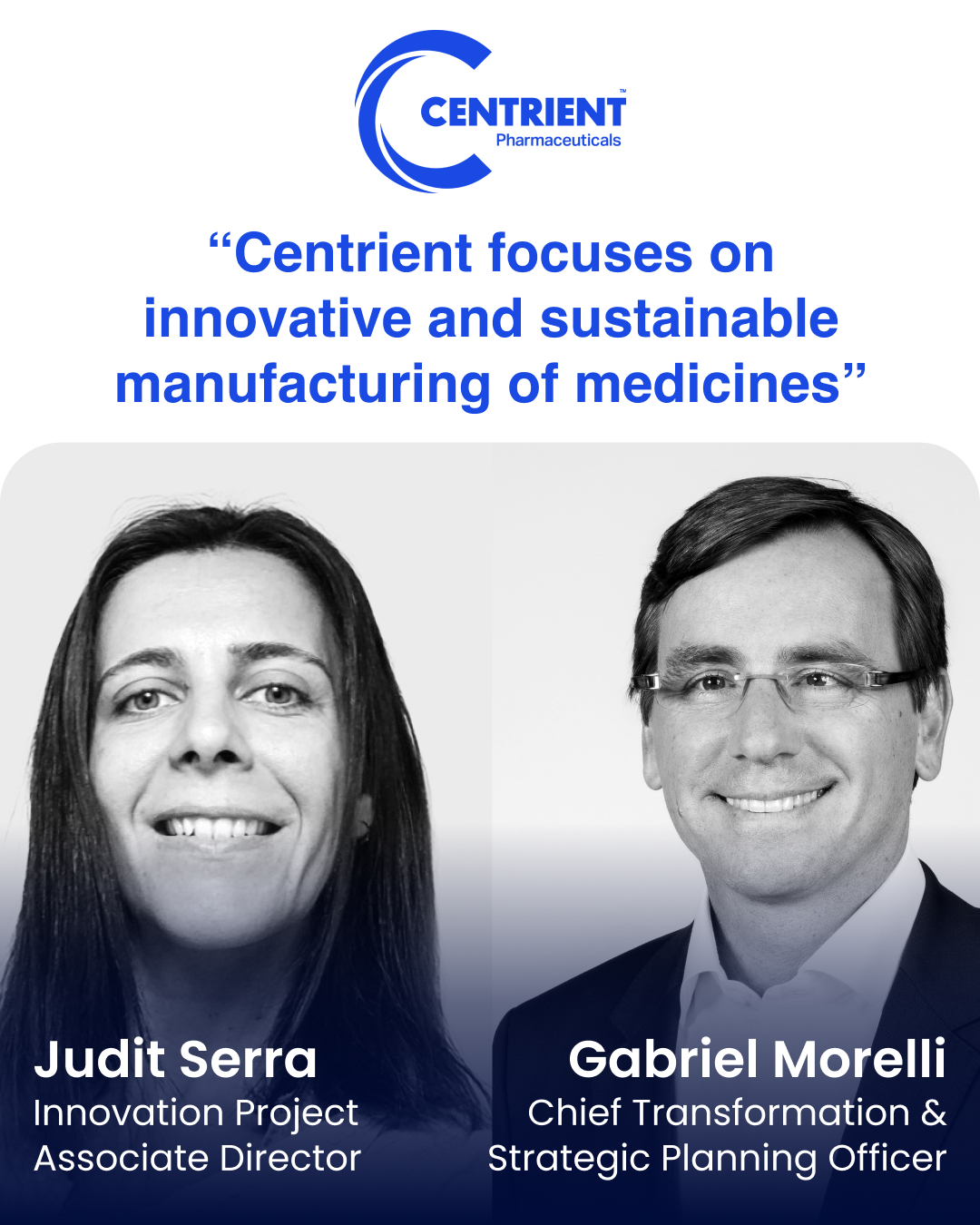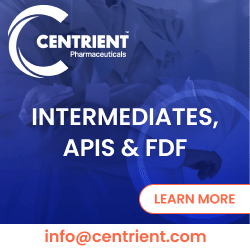
#SpeakPharma with Centrient Pharmaceuticals
2022-10-12
Impressions: 3078
This week, SpeakPharma interviews two top executives from Centrient Pharmaceuticals — Gabriel Morelli, Chief Transformation and Strategic Planning Officer, and Judit Serra, Innovation Project Associate Director. Centrient Pharmaceuticals is a global B2B leader in sustainable, enzymatic antibiotics, next-generation statins and anti-fungals. In 2021, the over 150-year-old pharma company facilitated more than 1.5 billion patient treatments. The duo talks about Centrient's track record in innovative and sustainable manufacturing of medicines, the company's strategy for the future and the recently established New Pipeline program.
Can you briefly take us through Centrient’s history and vision?
Gabriel Morelli: Our company was founded in 1869, and its story has been one of constant evolution and innovation. Known initially as Nederlandsche Gist- en Spiritusfabriek, the company was rechristened twice – as Gist Brocades and DSM Sinochem Pharmaceuticals – before being rebranded as Centrient Pharmaceuticals. We are currently a 2,200-people strong company with operations spread across four continents. Bain & Company has owned Centrient since 2018.
Over the years, we have established ourselves as a global B2B leader in sustainable, enzymatic antibiotics, next-generation statins and anti-fungals. We produce and sell intermediates, active pharmaceutical ingredients (APIs), tablets, capsules and other finished dosage forms (FDFs). We are an agile, evolving and ever-growing company.
Our vision aligns with our company’s purpose of improving patients’ lives worldwide by capitalizing on our key strength – the innovative and sustainable manufacturing of medicines. We are customer-centred and aim to be the partner of choice for enzymatic development and manufacturing, offering a diversified portfolio of sustainably made products, cost efficiency and an integrated global network of manufacturing facilities.
What are some of the sustainability initiatives Centrient has undertaken?
Gabriel Morelli: We have a long history of innovation and leadership in sustainability. Centrient was one of the first companies in the world to produce antibiotics on an industrial scale shortly after World War II. Since then, we've changed how sustainable antibiotics are made by utilizing our innovative enzymatic platform – with more than 500 patents across nearly 80 patent families.
First introduced in the market as the PureActives range of products, our proprietary platform replaces the traditional 13-step production process with more efficient, environment-friendly methods. Our simplified process requires less energy and water and avoids the use of harmful solvents and other chemicals. Between 2008 and 2020, we cut our carbon emissions by 50 per cent and energy and water consumption by 45 per cent and 25 per cent, respectively.
As a pharmaceutical manufacturer, we also recognize the importance of responsible wastewater management. With our state-of-the-art wastewater treatment plants, water recycling programs and projects supporting local communities, we contribute to clean water and sanitation. Our scientists developed a highly sensitive method for detecting very low antibiotic activity levels in treated wastewater. We monitor and clean our wastewater to prevent the release of antibiotics into the environment, which may lead to antimicrobial resistance. According to the World Health Organization, antimicrobial resistance is one of the biggest threats to human health.
Earlier this year, we achieved an important milestone in responsible manufacturing. We fully comply with the stringent Predicted No-Effect Concentration (PNEC) discharge targets developed and adopted by the AMR Industry Alliance. PNEC refers to the 'safe' concentration of antibiotics in water that is unlikely to cause adverse environmental risks due to the development of antimicrobial resistance.
We are proud to produce essential medicines for patients worldwide while minimizing our impact on the environment, preventing antimicrobial resistance and supporting the communities in which we operate.
Tell us about Centrient's New Pipeline program. Which new therapeutic areas does the company plan to enter?
Judit Serra: In 2021, we initiated Centrient's New Product Pipeline program intending to reach out to more patients and meet the needs of our customers through new and innovative products.
We have started work on expanding our core portfolio of antibiotics and statins by adding specific 'close-to-core' programs to broaden our customer offerings. This includes the statin Pitavastatin and some antibiotics such as Pen-G benzathine and Procaine, Nafcillin, Ceftazidime and Piperacillin.
In addition to expanding our deep knowledge of manufacturing antibiotics and statins using our innovative bioprocesses, Centrient is already exploring new therapeutic areas by entering into short and mid-term partnerships. Our unique position makes us flexible and open to setting up reliable and valuable collaborations with small, innovative biotech companies and synergetic pharmaceutical companies.
How important are R&D and innovation to the growth of your company?
Judit Serra: Centrient is driven by innovation. It is in our DNA.
From the beginning, we have played a leading role in the "greenification" of the industry by implementing innovative bioprocesses to produce antibiotics. We also applied this technology to the production of statins.
We have established a highly technical team in the Netherlands that leads the continuous improvement of existing enzymatic processes. This allows us to position our products well in the market.
We keep working daily towards making our manufacturing processes more sustainable by further reducing our manufacturing footprint. This translates into reducing our energy and water consumption in the production process. The New Pipeline program is designed to bring this technology and sustainable angle to other high-value therapeutic areas, allowing us to grow into an Active Pharmaceutical Ingredients to Finished Dosage Forms manufacturer.
R&D is the key element in driving a program that's well aligned with customer and patient needs and brings additional value to all stakeholders.
How has the acquisition of Astral SteriTech helped Centrient?
Judit Serra: The acquisition of Astral SteriTech in 2021 has helped us add the niche but attractive segment of sterile injectable antibiotics – semi-synthetic Cephalosporin and Penicillin finished dosage forms (FDFs) – to our portfolio of products. With Astral SteriTech’s USFDA-approved manufacturing site with two manufacturing lines, we can serve customers in highly regulated markets like the United States and South Asia.
In parallel, we are focusing on the vertical integration of our FDFs – meaning using our own produced intermediates and APIs for manufacturing FDFs. In this area, we also collaborate with trusted contract manufacturing organizations (CMOs) with whom we have long-term partnerships.
At Centrient, we are focused on meeting our customers' expectations and serving their needs for innovative products and processes. Innovation will continue to drive growth in the generic pharmaceutical market, and Centrient is convinced to be the right partner. We invite customers seeking new added-valued collaborations in the future to reach out to us.





